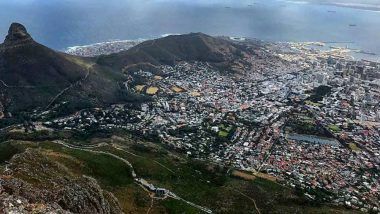After three years of drought, the South African city Cape Town has less than 90 days of water in its tanks. Day Zero, the dreaded day is presumed to be 22 April and in the process making Cape Town, the first major city in the world to run out of the water. The city has introduced a water map to track the usage of its residents. City officials said that a new water levy will be implemented as early as possible. To address the issue, drilling on the Cape Flats Aquifer has been started. But these projects are expensive, hence a drought levy proposal has been forwarded by Cape Town Mayor Patricia De Lille.
If the Finance Minister Malusi Gigaba accepts the proposal, the levy is expected to come into force from February 1, 2018. It is proposed to run for four years and is expected to raise one billion rand annually. The water levy further waits for an approval by Cape Town’s City Council. The levy would be based on property values and will be calculated between 10 percent and 11 percent of the rates portion of the municipal account. The charges are said to affect property owners valued at more than 400 000 rand and business property owners’ worth more than 50 000 rand.
Media reports suggest that city’s residents are not happy with the said proposal. It says that the decision is harsh on people who have put enough effort to save water.
Meanwhile, Mayor Patricia warns that unless the residents drastically cut down their water usage, taps in the seaside metropolis will soon dry. People will have to take short showers, flushing the toilet only when it is necessary and recycling bathing water.
“Day Zero” (or April 22) is real and is calculated every week based on current reservoir capacity and daily consumption. The drought has been caused by very low rainfall over the past few years and increased water consumption by the city’s growing population. It has been instructed that each resident should use 87 litres per day and will be fined if anyone breaks the rule. Authorities have further stated to reduce the city’s consumption to 500 million litres a day; half the amount used two years ago. Car washing, topping up swimming pools and watering the gardens have been banned. But reports say that only 54% of residents are hitting the set target which is one of the reasons why the Day Zero has been moved a week earlier from April 29 this year.
It has been decided by the city authorities that once the dams reach 13.5% capacity, municipal water supply will be turned off for all apart from essential services like hospitals. If the taps are turned off, residents will have to go to one of nearly 200 municipal water points throughout the city where they can collect a maximum of 25 litres per day.
Cape Town is in a difficult position. City planners had pointed out that water capacity to not be in line with its population growth, which has nearly doubled over the past 20 years. Climatologists say that a three-year drought in this scale is “once a millennium”. Climate change researchers further predicts more frequent dry years and fewer wet years to come.
(The above story first appeared on LatestLY on Jan 17, 2018 07:19 PM IST. For more news and updates on politics, world, sports, entertainment and lifestyle, log on to our website latestly.com).













 Quickly
Quickly













